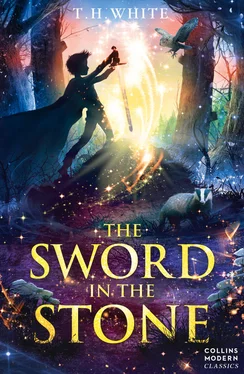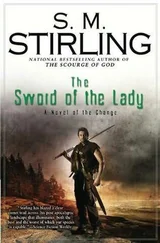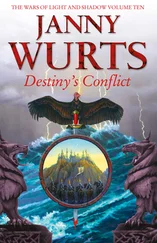T. H. White - The Sword in the Stone
Здесь есть возможность читать онлайн «T. H. White - The Sword in the Stone» — ознакомительный отрывок электронной книги совершенно бесплатно, а после прочтения отрывка купить полную версию. В некоторых случаях можно слушать аудио, скачать через торрент в формате fb2 и присутствует краткое содержание. Жанр: unrecognised, на английском языке. Описание произведения, (предисловие) а так же отзывы посетителей доступны на портале библиотеки ЛибКат.
- Название:The Sword in the Stone
- Автор:
- Жанр:
- Год:неизвестен
- ISBN:нет данных
- Рейтинг книги:4 / 5. Голосов: 1
-
Избранное:Добавить в избранное
- Отзывы:
-
Ваша оценка:
- 80
- 1
- 2
- 3
- 4
- 5
The Sword in the Stone: краткое содержание, описание и аннотация
Предлагаем к чтению аннотацию, описание, краткое содержание или предисловие (зависит от того, что написал сам автор книги «The Sword in the Stone»). Если вы не нашли необходимую информацию о книге — напишите в комментариях, мы постараемся отыскать её.
The Sword in the Stone — читать онлайн ознакомительный отрывок
Ниже представлен текст книги, разбитый по страницам. Система сохранения места последней прочитанной страницы, позволяет с удобством читать онлайн бесплатно книгу «The Sword in the Stone», без необходимости каждый раз заново искать на чём Вы остановились. Поставьте закладку, и сможете в любой момент перейти на страницу, на которой закончили чтение.
Интервал:
Закладка:
The Wart loved haymaking, and was good at it. Kay, who was two years older, generally stood on the edge of the bundle of hay which he was trying to pick up, with the result that he worked twice as hard as the Wart for only half the result. But he hated to be beaten by anybody at anything and used to fight away with the wretched hay – which he loathed like poison – until he was quite sick.
The day after Sir Grummore’s visit was hot, sweltering for the men who toiled from milking to milking and then again till sunset in their battle with the sultry element. For the hay was an element to them, like sea or air, in which they bathed and plunged themselves and which they even breathed in. The seeds and small scraps stuck in their hair, their mouths, their nostrils, and worked, tickling, inside their clothes. They did not wear many clothes, and the shadows between their sliding muscles were blue on the nut-brown skins. Those who feared thunder had felt ill that morning.
In the afternoon a terrible storm came. Sir Ector kept them at it till the great flashes were right overhead, and then, with the sky as dark as night, the rain came hurling against them so that they were drenched at once and could not see a hundred yards. The boys lay crouched under the waggons, wrapped in hay to keep their wet bodies warm against the now cold wind, and all joked with one another while heaven fell. Kay was shivering, though not with cold, but he joked like the others because he would not show he was afraid. At the last and greatest thunderbolt every man startled involuntarily, and each saw the other startle, until they all laughed away their shame.
But that was the end of the haymaking for them and the beginning of play. The boys were sent home to change their clothes. The old dame who had been their nurse fetched dry jerkins out of a press, and scolded them for catching their deaths, and denounced Sir Ector for keeping them on so long. Then they slipped their heads into the laundered shirts, and ran out into the refreshed and sparkling court.
“I vote we take Cully and see if we can get some rabbits in the chase,” cried the Wart.
“The rabbits won’t be out in this wet,” said Kay sarcastically, delighted to have caught him out over natural history.
“Oh, come on,” said the Wart. “It’ll soon dry.”
“I must carry Cully, then.”
Kay insisted on carrying the goshawk and flying her, when they went out together. This he had a right to do, not only because he was older than the Wart but also because he was Sir Ector’s proper son. The Wart was not a proper son. He did not understand about this, but it made him feel unhappy, because Kay seemed to regard it as making him inferior in some way. Also it was different not having a father and mother, and Kay had taught him that being different was necessarily wrong. Nobody talked to him about it, but he thought about it when he was alone, and was distressed. He did not like people to bring it up, and since the other boy always did bring it up when a question of precedence arose, he had got into the habit of giving in at once before it could be mentioned. Besides, he admired Kay and was a born follower. He was a hero-worshipper.
“Come on, then,” cried the Wart, and they scampered off towards the mews, turning a few cartwheels on the way.
The mews was one of the most important parts of the castle, next to the stables and the kennels. It was opposite to the solar and faced south. The outside windows had to be small, for reasons of fortification, but the windows which looked inwards to the courtyard were big and sunny. All the windows had close vertical slats nailed down them, but no horizontal ones. There was no glass, but to keep the hawks from draughts there was horn in the small windows. At one end of the mews there was a little fireplace and a kind of snuggery, like the place in a saddle-room where the grooms sit to clean their tack on wet winter nights after hunting. Here there were a couple of stools, a cauldron, a bench with all sorts of small knives and surgical instruments, and some shelves with pots on them. The pots were labelled Cardamum, Ginger, Barley Sugar, Wrangle, For a Snurt, For the Craye, Vertigo, etc. There were leather skins hanging up, which had been snipped about as pieces were cut out of them for jesses, hoods or leashes. On the neat row of nails there were Indian bells and swivels and silver varvels each with Ector cut on. A special shelf, and the most beautiful of all, held the hoods: very old cracked rufter hoods which had been made for birds before Kay was born, tiny hoods for the merlins, small hoods for tiercels, splendid new hoods which had been knocked up to pass away the long winter evenings. All the hoods, except the rufters, were made in Sir Ector’s colours: white leather with red baize at the sides and a bunch of blue grey plumes on top, made out of the hackle feathers of herons. On the bench there was a jumble of oddments such as are to be found in every workshop, bits of cord, wire, metal, tools, some bread, and cheese which the mice had been at, a leather bottle, some frayed gauntlets for the left hand, nails, bits of sacking, a couple of lures and some rough tallies scratched on the wood. These read: Conays IIIIIIII, Harn III, etc. They were not spelt very well.
Right down the length of the room, with the afternoon sun shining full on them, there ran the screen perches to which the birds were tied. There were two little merlins which had only just been taken up from hacking, an old peregrine who was not much use in this wooded country but who was kept for appearances, a kestrel on which the boys had learnt the rudiments of falconry, a spar-hawk which Sir Ector was kind enough to keep for the parson, and caged off in a special apartment of his own at the far end, there was the tiercel goshawk Cully.
The Mews was neatly kept, with sawdust on the floor to absorb the mutes, and the castings taken up every day. Sir Ector visited the mews each morning at seven o’clock and the two austringers stood at attention outside the door. If they had forgotten to brush their hair he confined them to barracks. They took no notice.
Kay put on one of the left-handed gauntlets and called Cully from the perch; but Cully, with all his feathers close-set and malevolent, glared at him with a mad marigold eye and refused to come. So Kay took him up.
“Do you think we ought to fly him?” asked the Wart doubtfully. “Deep in the moult like this?”
“Of course we can fly him, yon ninny,” said Kay. “He only wants to be carried a bit, that’s all.”
So they went out across the hay-field, noting how the carefully-raked hay was now sodden again and losing its goodness, into the chase where the trees began to grow, far apart as yet and parklike, but gradually crowding into the forest shade. The conies had hundreds of buries under these trees, so close together that the problem was not to find a rabbit, but find a rabbit far enough away from its hole.
“Hob says that we mustn’t fly Cully till he has roused at least twice,” said the Wart.
“Hob doesn’t know anything about it,” said the other boy. “Nobody can tell whether a hawk is fit to fly except the man who is carrying it.
“Hob is only a villein anyway,” added Kay, and began to undo the leash and swivel from the jesses.
When he felt the trappings being taken off him, so that he was in hunting order, Cully did make some movements as if to rouse. He raised his crest, his shoulders coverts and the soft feathers of his thighs, but at the last moment he thought better or worse of it and subsided without the rattle. This movement of the hawk’s made the Wart itch to carry him, so that he yearned to take him away from Kay and set him to rights himself. He felt certain that he could get Cully into a good temper by scratching his feet and softly teasing his breast feathers upwards, if only he were allowed to do it himself, instead of having to plod along behind with the stupid lure; but he knew how annoying it must be for Kay to be continually subjected to advice, and so he held his peace. Just as in modern shooting you must never offer criticism to the man in command, so in hawking it was important that no outside advice should be allowed to disturb the judgement of the actual austringer.
Читать дальшеИнтервал:
Закладка:
Похожие книги на «The Sword in the Stone»
Представляем Вашему вниманию похожие книги на «The Sword in the Stone» списком для выбора. Мы отобрали схожую по названию и смыслу литературу в надежде предоставить читателям больше вариантов отыскать новые, интересные, ещё непрочитанные произведения.
Обсуждение, отзывы о книге «The Sword in the Stone» и просто собственные мнения читателей. Оставьте ваши комментарии, напишите, что Вы думаете о произведении, его смысле или главных героях. Укажите что конкретно понравилось, а что нет, и почему Вы так считаете.












